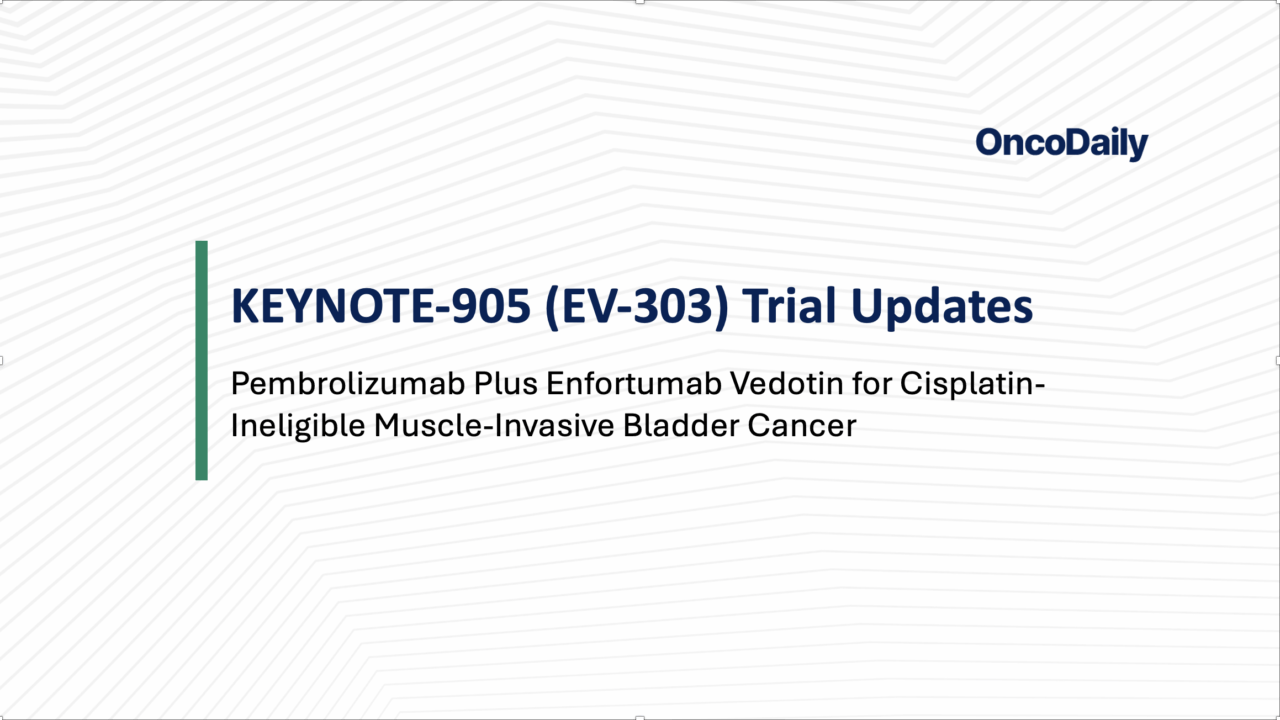On August 12, 2025, Merck announced positive topline results from the Phase 3 KEYNOTE-905 trial (EV-303), marking a breakthrough in treatment for patients with muscle-invasive bladder cancer (MIBC) who are ineligible for cisplatin-based chemotherapy. The combination of pembrolizumab (Keytruda®) and enfortumab vedotin-ejfv (Padcev®), administered both before and after radical cystectomy, demonstrated a statistically significant and clinically meaningful improvement in event-free survival (EFS), overall survival (OS), and pathologic complete response (pCR) rate compared to surgery alone.
This trial represents the “first and only systemic therapy to improve survival when used before and after surgery for patients with MIBC who are ineligible for cisplatin-based chemotherapy,” underscoring the importance of this milestone for a historically underserved patient population.
Background
Bladder cancer is the ninth most common cancer worldwide, with more than 614,000 new cases diagnosed annually. Muscle-invasive bladder cancer accounts for roughly 30% of cases. The current standard of care involves neoadjuvant cisplatin-based chemotherapy followed by radical cystectomy, which has been shown to prolong survival. However, up to half of MIBC patients are not eligible for cisplatin due to comorbidities or poor kidney function and thus face limited treatment options, often undergoing surgery alone. This population experiences high rates of disease recurrence and poor prognosis.
Dr. Christof Vulsteke, MD, PhD, head of the Integrated Cancer Center Ghent and principal investigator for KEYNOTE-905, emphasized the impact of this unmet need:
“Patients with muscle-invasive bladder cancer who are ineligible for cisplatin-based chemotherapy have not seen any treatment advance beyond surgery and face high rates of disease recurrence and a poor prognosis, even after having their bladder removed.”
He noted that
“The KEYNOTE-905 study results mark the first time a systemic treatment approach, used before and after surgery, significantly extended survival over standard-of-care surgery in this population, demonstrating the potential of this combination to address a critical unmet need.”

Learn more about Bladder Cancer Treatment: The Game-Changing Role of Antibody-Drug Conjugates (ADCs) on OncoDaily.
Trial Design
KEYNOTE-905 (EV-303) is an open-label, randomized, multi-arm Phase 3 trial (ClinicalTrials.gov identifier: NCT03924895) designed to evaluate perioperative pembrolizumab with or without enfortumab vedotin compared to surgery alone in patients with MIBC who were either ineligible for or declined cisplatin-based chemotherapy.
A total of 595 patients were randomized into three treatment arms:
- Arm A: Three cycles of preoperative pembrolizumab, followed by radical cystectomy, then 14 cycles of postoperative pembrolizumab.
- Arm B: Surgery alone (radical cystectomy).
- Arm C: Three cycles of preoperative pembrolizumab plus enfortumab vedotin, followed by surgery, then six cycles of postoperative pembrolizumab plus enfortumab vedotin, followed by eight cycles of pembrolizumab alone.
The primary endpoint was event-free survival comparing Arm C (combination therapy) versus Arm B (surgery alone). EFS was defined as the time from randomization to the first occurrence of progression that precludes surgery, failure to undergo surgery with residual disease, gross residual disease at surgery, local or distant recurrence, or death from any cause.
Key secondary endpoints included overall survival and pathologic complete response rate comparisons between Arm C and Arm B, as well as EFS, OS, and pCR rate comparisons between Arm A and Arm B. The study remains ongoing to evaluate these latter endpoints.
Efficacy Results
The combination of pembrolizumab plus enfortumab vedotin significantly improved event-free survival over surgery alone, demonstrating a meaningful reduction in the risk of disease progression, recurrence, or death. In addition, overall survival was notably longer in patients receiving the combination compared to surgery alone.
The pathologic complete response rate was also significantly higher in the combination arm, reflecting more patients achieving no residual tumor at the time of surgery. These positive findings represent a substantial advancement for this high-risk population, offering hope for improved long-term outcomes.
Dr. Marjorie Green, senior vice president and head of oncology global clinical development at Merck Research Laboratories, commented,
“There is a real and pressing need for more effective options for patients with bladder cancer who are ineligible for cisplatin-based treatment. The compelling survival results observed in this study reinforce the potential of combining KEYTRUDA with an antibody-drug conjugate to help address a significant unmet need in this vulnerable population.”
Further detailed efficacy datasets including median survival and hazard ratios will be presented at upcoming medical conferences.

Read more about Enfortumab Vedotin (Padcev): Uses in Cancer, Side Effects, Dosage, Expectations on OncoDaily.
Safety Profile
The safety of pembrolizumab plus enfortumab vedotin in this perioperative setting was consistent with the known profiles of each agent. No new safety signals emerged from the combination therapy.
Pembrolizumab, a PD-1 immune checkpoint inhibitor, carries a risk of immune-mediated adverse reactions affecting multiple organ systems. Across the broad clinical program, immune-mediated pneumonitis occurred in approximately 3.4% of patients, with Grade 3 or higher events seen in around 1.2%, including rare fatalities. Other immune-related adverse events such as colitis (1.7%), hepatitis (0.7%), and endocrinopathies including hypothyroidism (8%) and hyperthyroidism (3.4%) were also observed. Most immune toxicities required treatment interruption and corticosteroids, with some patients discontinuing therapy permanently.
Enfortumab vedotin, an antibody-drug conjugate targeting Nectin-4, is associated with toxicities such as peripheral neuropathy, skin reactions, hyperglycemia, ocular side effects, and infusion-related reactions. These adverse events were manageable within the study framework. Infusion-related reactions including hypersensitivity and anaphylaxis were rare but require careful monitoring.
Clinical Significance and Future Directions
The KEYNOTE-905 trial is the first Phase 3 study to show a survival benefit for a systemic perioperative treatment in cisplatin-ineligible muscle-invasive bladder cancer. The combination of pembrolizumab and enfortumab vedotin, when administered before and after surgery, may establish a new standard of care for this underserved patient population.
Merck is actively pursuing regulatory submissions based on these data and plans to present the full dataset at forthcoming oncology meetings.
In addition, Merck is conducting five additional Phase 3 trials evaluating pembrolizumab across various stages of bladder cancer. These include KEYNOTE-866, KEYNOTE-992, and KEYNOTE-B15 (EV-304) focusing on muscle-invasive disease, as well as KEYNOTE-676 assessing pembrolizumab combined with BCG in non-muscle-invasive bladder cancer.
Read Full article on MERCK Official Website.
About Pembrolizumab and Enfortumab Vedotin
Pembrolizumab (Keytruda) is a humanized monoclonal antibody that blocks the interaction between PD-1 and its ligands, PD-L1 and PD-L2, thereby enhancing T-cell-mediated immune responses against tumor cells. It is approved in multiple cancer types including urothelial carcinoma, either as monotherapy or in combination with enfortumab vedotin.
Enfortumab vedotin (Padcev) is an antibody-drug conjugate that targets Nectin-4, a protein commonly expressed on urothelial cancer cells, delivering a cytotoxic agent directly to the tumor and inducing cancer cell death.

Conclusion
The KEYNOTE-905 (EV-303) trial establishes pembrolizumab plus enfortumab vedotin as a groundbreaking systemic treatment for cisplatin-ineligible muscle-invasive bladder cancer. By significantly improving event-free survival, overall survival, and pathologic complete response rates compared to surgery alone, this regimen has the potential to transform outcomes for patients with limited therapeutic options.


